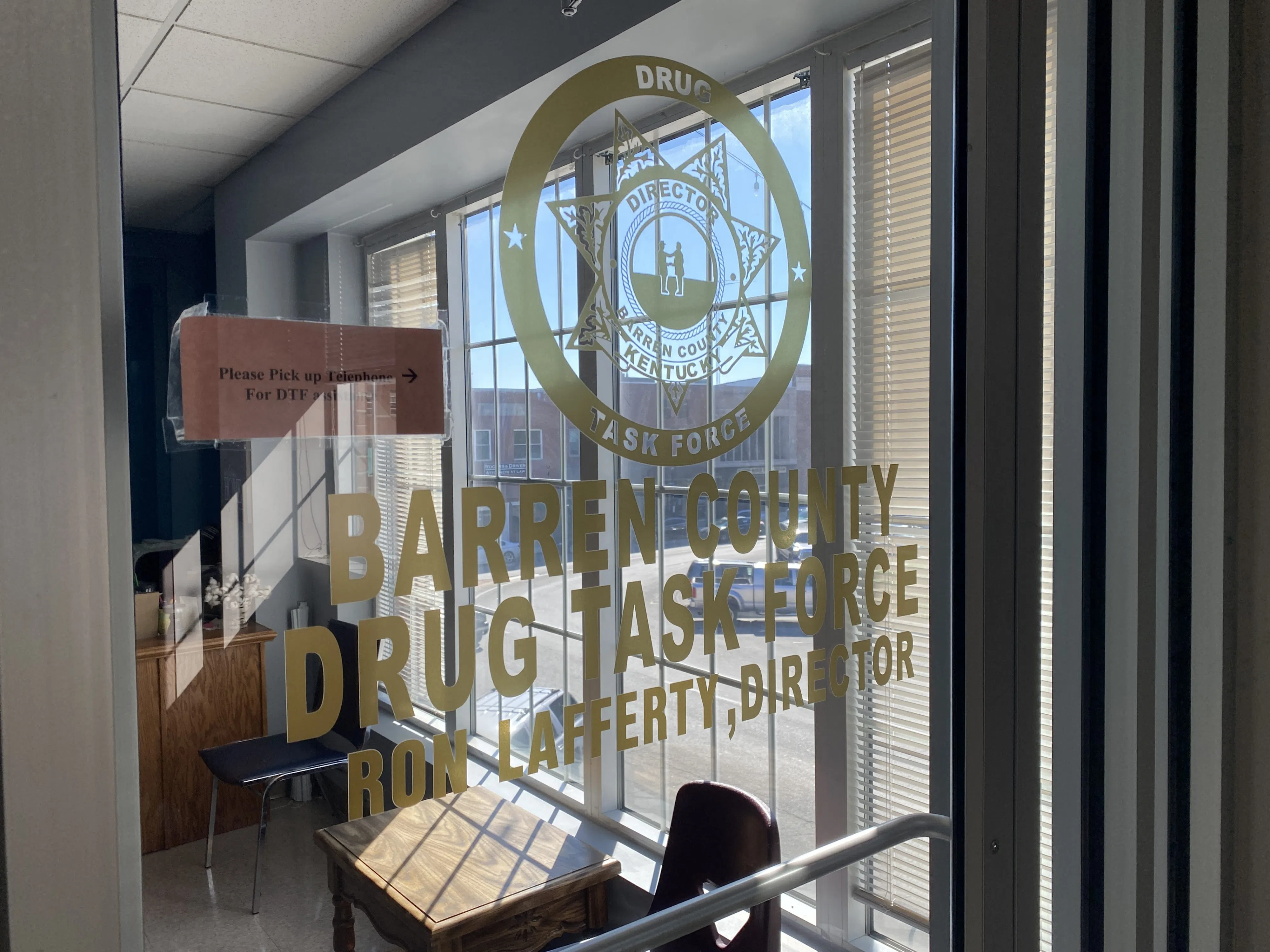
The Barren River Drug Task Force is located on the second floor of the Barren County Government Building. Michael Crimmins/Glasgow News 1.
By MICHAEL CRIMMINS
Glasgow News 1
For two decades the Barren River Drug Task Force has been working to keep illegal drugs and narcotics out of the multiple counties it serves.
The task force was created in 2003 when the Barren County Fiscal Court and the judge-executive decided they needed a department to combat the surge of methamphetamines and meth labs.
Back then the task force — which was comprised of Glasgow and Cave City police departments and the sheriff’s office — was simply referred to as the Barren County Drug Task Force until Edmonson and Allen counties joined. When Ron Lafferty was raised to director of the task force in 2014, he changed it to its current name.
Currently, the task force is comprised of Barren and Metcalfe counties.
Lafferty said the mission of the task force was not to arrest or investigate users of drugs but to “go after the people who get the drugs into people’s hands”
“Our mission is to go after mid- to upper-level drug traffickers,” Lafferty said. “We get a lot of calls for users but if we did that every single day we’d be consumed by going after users and we would not have the time to go after the actual traffickers’ the ones that are bringing it in.”
With 20 years under the task force’s belt, Lafferty reflects on what they have done well, some challenges they’ve faced and offered a look into the future. According to statistics Lafferty produced, the amount of drugs they have seized has increased exponentially since its founding in 2003.
In the previous year the task force saw a 128 percent increase in crystal meth seizures; confiscating more than 28 pounds.
“I don’t know if I’d say good year but as far as getting drugs off the streets it was a good year,” Lafferty said. “In 2021 it skyrocketed, I never dreamed we would beat this record but then 2022 hit and we exceeded that. I thought well that’ll never happen again but then 2023 hit and 2024 is on the same pace.”
Lafferty said along with drug seizures comes firearms confiscation, which also increased from 2022 to 2023.
In addition to the tangible success shown in the statistics, Lafferty said he is also proud of the personnel, communication, cooperation and reputation the task force garnered through the years.
“The one thing that’s remained consistent is that we’ve always had good detectives,” Lafferty said. “If we don’t work together it doesn’t work. If we didn’t have the relationships we do [then] we couldn’t do what we do.”
“We have a reputation of doing our job and doing it well [and] I think it’s been well earned,”Lafferty added.
Of course with the good things comes the challenges. Lafferty said one of the main challenges was the issues with the Edward Byrne Memorial Justice Assistance Grant, which “provides states and units of local governments with critical funding necessary to support a range of program areas including law enforcement, prosecution and court programs, prevention and education programs, corrections and community corrections, drug treatment and enforcement” that has been decreasing through the years as legislators redistribute those funds.
“Some legislators are cutting into that grant and using it for different things [so] our funding keeps going down and they have forgotten or don’t know why the grant was created,” Lafferty said.
One of the big differences between the task for and local police departments or sheriff’s offices is that members of the task force essentially “follow the trail” of drugs that oftentimes takes them outside the confines of the counties.
“Drugs just don’t appear here,” Lafferty said. “We work outside the box. We work with the FBI, the DEA, the ATF, Homeland Security [and] the U.S. Postal Inspector. Our reach goes outside the boundaries of the county…. The citizens of Barren and Metcalfe counties want us to work here but anything that leads [out of the counties] starts here. We’re not going to go to another county or state to work on a case that wasn’t developed here.”
Lafferty said his plan for the future is to keep “trucking along till it’s time to go home.”
“I would love to say we’re going to eradicate it,” Lafferty said. “I’d love for them to come to me and say ‘Ron you all have got all the drugs out of here, we don’t need your services anymore.’ I would gladly leave then, but I hope that the next 20 years, the next five years, however long we’re here, that the way we do things and the way we work with people never changes. Drugs are always changing…we don’t know what the next thing is going to be out there so I hope the next 20 years is better than the last 20 years.”

Comments